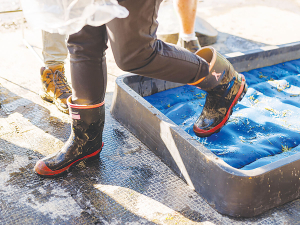NZ winegrowers advance vineyard biosecurity in 2025
The year was marked by “progress, collaboration and reflection” in biosecurity, says New Zealand Winegrowers Biosecurity Advisor Jim Herdman.
 Good biosecurity practices also help to manage endemic diseases like Bovine viral diarrhoea (BVD) and Johne’s disease.
Good biosecurity practices also help to manage endemic diseases like Bovine viral diarrhoea (BVD) and Johne’s disease.
OPINION: When it comes to biosecurity, we often hear about the end of a response, but it’s the beginning that helps determine our success.
August is Biosecurity Awareness Month and a timely reminder that we need to stay vigilant to help protect our valuable dairy sector.
In June, it was reported that New Zealand could be provincially declared free of Mycoplasma bovis (M. bovis) as early as October 2025; A huge milestone and one we should be proud of.
It’s a milestone that could only be achieved through the tough decisions made along the way.
We want to take the experiences and lessons we had through the M. bovis response to prepare for future disease outbreaks.
We recently signed a new operational agreement on Foot and Mouth Disease (FMD) with the Government and sector partners which sets out how the costs of FMD readiness and response activities will be shared.
It also creates legally binding participation of industry in decision-making, ensuring that farmers’ interests, knowledge, and input is heard.
It is a real partnership, not only between the sector and Government but also within sector partners.
As part of the agreement, dairy, beef, sheep, pork, and deer farmers are represented, as well as dairy and meat processors. Each has a strong voice at the negotiation table.
As the inaugural chair of the Foot and Mouth Disease Council it’s something that I’m personally proud to have achieved. And I want to keep that momentum going.
We are reviewing our FMD operational plans and looking at the role the sector plays during a response.
We want to boost our workforce capability and capacity, so we have the right people with the right knowledge in place if we had another serious disease outbreak.
We are also focusing on refining the compensation system. We need a pragmatic and fair system that will provide farmers with the support they need. That includes timely, fair, and consistent compensation that allows farmers to get back to business as fast as possible.
Good biosecurity practices not only provide a degree of protection against potential exotic disease outbreaks, but they can also help to manage endemic diseases like Bovine viral diarrhoea (BVD) and Johne’s disease.
It can be as simple as:
Biosecurity is not just about emergencies, it's about a consistent and integrated approach to risk reduction, readiness, response, and recovery.
Getting the planning right isn't just important, it's everything.
Campbell Parker is DairyNZ chief executive.
Animal welfare is of paramount importance to New Zealand's dairy industry, with consumers increasingly interested in how food is produced, not just the quality of the final product.
Agriculture and Forestry Minister Todd McClay is encouraging farmers and growers to stay up to date with weather warnings and seek support should they need it.
The closure of SH2 Waioweka Gorge could result in significant delays and additional costs for freight customers around the Upper North Island, says Transporting New Zealand.
OPINION: The year has started positively for New Zealand dairy farmers and things are likely to get better.
Ministry for Primary Industries (MPI) Director General Ray Smith believes there is potential for an increase in dairy farming in New Zealand.
New Zealand's new Special Agricultural Trade Envoy, Horowhenua dairy farmer, company director and former Minister of Agriculture, Nathan Guy says the Free Trade Agreement (FTA) with India is a good deal for the country.